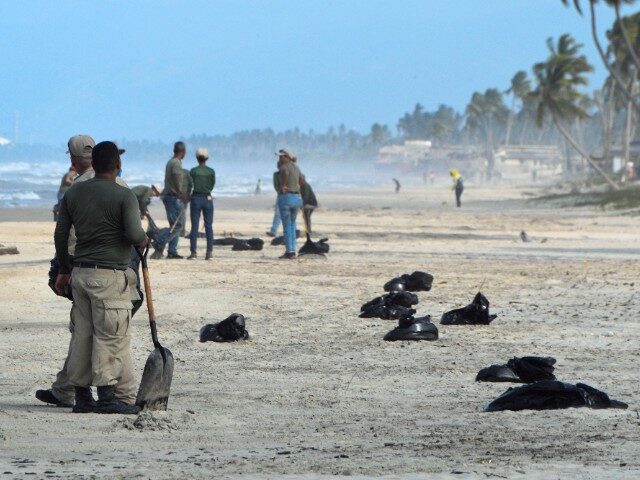A massive oil spill near Venezuela’s El Palito refinery has grown to the size of 37,000 soccer fields, Venezuelan marine biologist Eduardo Klein told Radio France Internationale (RFI) on Wednesday.
The socialist regime’s decades of mismanagement of Venezuela’s oil industry has left it in a near-ruined state, causing constant regular oil spills. Socialist dictator Nicolás Maduro has often blamed capitalism for climate change and other environmental disasters and, in 2019, claimed that socialism is “the only way to preserve the environment and the salvation of the human species.”
The oil spill marks the third large incident of its kind caused by the El Palito refinery since 2020. The refinery, located in the northwestern state of Carabobo, belongs to Venezuela state-owned PDVSA oil company, which, under the socialist Maduro regime’s gross mismanagement, has been run to the ground alongside the rest of the nation’s oil infrastructure.
The refinery was allegedly “repaired” by Iran in 2022, and, since then, the facility is being used by the rogue Islamic regime to refine some of its oil in Venezuela.
The spill was first detected over the weekend by residents and fishermen of Boca de Aroa, a small coastal town in the state of Falcón. The local newspaper El Carabobeño confirmed shortly afterwards that the spill had extended across 15.5 miles from the coast of Puerto Cabello, a city in Carabobo, to Boca de Aroa in Falcón:
On Wednesday, Venezuelan environmentalist researcher Eduardo Klein warned RFI that if the oil spill is not contained, it could threaten two nearby marine parks populated by corals, mangroves, and seagrass beds.
Klein, who works at the University of Tasmania in Australia, stated that he follows the situation through satellite maps and imagery from Europe’s Copernicus space program. According to the latest imagery, dated August 18, the spill covered more than 300 square kilometers (115.83 square miles).
“That would be the equivalent of completely covering the city of Paris, not once, but three times,” Klein said, adding that the current “word on the street” is that the cause of the spill was a leak in a pipeline that connects the El Palito oil refinery to a thermoelectric plant and provides it with extra heavy fuel.
The researcher pointed out that similar incidents in recent years have plagued the site.
In December 2023, an oil spill occurred in El Palito that affected some of Carabobo’s beaches. The Maduro regime, through its General Directorate of Military Counterintelligence (DGCIM), censored local media from being able to cover the accident. Venezuela’s National Union of Press Workers (SNTP) denounced at the time that the Venezuelan National Guard had forced journalists to delete pictures and footage of the spill.
Another massive oil spill caused by the El Palito refinery occurred in July 2020. News of the spill coincided with reports of the Maduro regime’s failed attempts to reactivate the rundown refinery at that time. The spill was eventually detected during the first days of August 2020 and the Maduro regime claimed that it had occurred on August 10, roughly three weeks after the accident had taken place.
Experts estimated that El Palito’s 2020 oil spill was twice as large as the one that occurred on the African island-state of Mauritius in August 2020, stressing that it would take at least 50 years for the affected areas to recover.
“There is a higher probability of such an accident occurring if the facilities are not properly maintained. That is the specific case of the oil industry in Venezuela,” Klein said.
“There has been a disinvestment in the industry, an evident lack of maintenance that is evident in the previous spills, where the industry did not have the capacity to activate the contingency plan against spills that existed in the past due to lack of personnel and lack of equipment,” he continued.
The Maduro regime, after more than two decades of socialist mismanagement, left Venezuela’s flagship oil industry in a near-ruined state and has failed to bring it back to a proper functional state and recover Venezuela’s full oil output capabilities.
In May 2022, the Maduro regime signed a roughly $107 million deal with Iran — one of its key anti-U.S. allies — to have the Islamic regime repair El Palito. After the repairs reportedly concluded in October 2022, Iran also began using El Palito to refine upwards of 100,000 of its own oil.
Iran also assisted the Maduro regime throughout 2023 in renovation works for the Paraguaná Refining Center. The center, located in the state of Falcón, is Venezuela’s largest refining complex and had also been left in a state of disrepair by the socialist regime’s mismanagement. In 2012, a massive gas explosion in the Amuay refinery — part of the broader Paraguana complex — left 48 dead, more than a hundred injured, and the facility severely damaged.
The Venezuelan Political Ecology Observatory (OEP), a nongovernment organization, denounced in January that it had registered 86 oil spills in Venezuela during 2023, at an average of seven per month. OEP registered a similar amount of spills during 2022, and 73 incidents during 2021.
Of the 86 spills registered during 2023, OEP explained in January, 40 occurred in the western state of Zulia and 32 in Falcón. In July 2023, local Zulian environmental organizations denounced that 40 percent of Lake Maracaibo, Venezuela’s largest, had been contaminated with a highly toxic cyanobacteria called microcystin. Local environmentalists blamed PDVSA’s constant oil and chemical spills on the lake for the presence of the toxic bacteria.
Christian K. Caruzo is a Venezuelan writer and documents life under socialism. You can follow him on Twitter here.

COMMENTS
Please let us know if you're having issues with commenting.